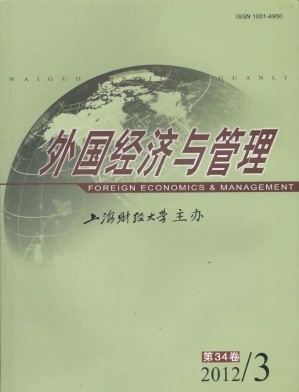组织情境下的权力研究述评
外国经济与管理 2012 年 第 34 卷第 03 期, 页码:72 - 80
摘要
参考文献
摘要
本文讨论了西方组织研究领域有关权力的问题,回顾了其中较为活跃的研究主题、理论视角和实证发现。本文围绕关于组织决策和人际互动的权力实施概念框架,系统梳理了权力的概念内涵,权力在组织中的来源及形成线索,权力对个人行为、人际互动以及组织决策的影响机制等方面的研究成果,并指出了未来研究方向。
[1]Anderson C and Galinsky A D.Power,optimism,and risk-ta-king[J].European Journal of Social Psychology,2006,36(4):511-536.
[2]Caza B B,et al.Power becomes you:The effects of implicit and explicit power on the self[J].Organizational Behavior and Hu-man Decision Processes,2011,114(1):15-24.
[3]Dubois D,et al.The accentuation bias[J].Social Psychological and Personality Science,2010,1(3):199-205.
[4]Finkelstein S.Power in top management teams:Dimensions,measurement,and validation[J].Academy of Management Journal,1992,35(3):505-538.
[5]Galinsky A D,et al.Power reduces the press of the situation:Implications for creativity,conformity,and dissonance[J].Journal of Personality and Social Psychology,2008,95(6):1450-1466.
[6]Giessner S R and Schubert T W.High in the hierarchy:How vertical location and judgments of leaders’power are interrela ted[J].Organizational Behavior and Human Decision Proces-ses,2007,104(1):30-44.
[7]Goodwin S A,et al.Power can bias impression processes:Ste-reotyping subordinates by default and by design[J].Group Processes&Intergroup Relations,2000,3(3):227-256.
[8]Guinote A and Phillips A.Power can increase stereotyping[J].Social Psychology,2010,41(1):3-9.
[9]Guinote A.The situated focus theory of power[M].New York,NY:The Guilford Press,2010:141-173.
[10]Inesi M E.Power and loss aversion[J].Organizational Beha-vior and Human Decision Processes,2010,112(1):58-69.
[11]Karremans J C and Smith P K.Having the power to forgive:When the experience of power increases interpersonal forgive-ness[J].Personality and Social Psychology Bulletin,2010,36(8):1010-1023.
[12]Keltner D,et al.Power,approach,and inhibition[J].Psycho-logical Review,2003,110(2):265-284.
[13]Lammers J,et al.Power increases hypocrisy[J].Psychologi-cal Science,2010,21(5):737-744.
[14]Lammers J and Stapel D A.Power increases dehumanization[J].Group Processes&Intergroup Relations,2011,14(1):113-126.
[15]Lee F and Tiedens L Z.Is it lonely at the top?The indepen-dence and interdependence of power holders[J].Research in Organizational Behavior,2001,23(1):43-91.
[16]Magee J C and Galinsky A D.Social hierarchy:The self-re-inforcing nature of power and status[J].Academy of Manage-ment Annals,2008,2(1):351-398.
[17]Magee J C and Smith P K.What drives the psychological effects of power?A comparison of the approach/inhibition and social distance theories[R].24Annual International As-sociation of Conflict Management Conference,2011.
[18]Maner J K,et al.Power,risk,and the status quo[J].Perso-nality and Social Psychology Bulletin,2007,33(4):451-462.
[19]Overbeck J R and Park B.Powerful perceivers,powerless ob-jects:Flexibility of powerholders’social attention[J].Organi-zational Behavior and Human Decision Processes,2006,99(2):227-243.
[20]Overbeck J R and Park B.When power does not corrupt:Su-perior individuation processes among powerful perceivers[J].Journal of Personality and Social Psychology,2001,81(4):549-565.
[21]Piff P K,et al.Having less,giving more:The influence of so-cial class on prosocial behavior[J].Journal of Personality and Social Psychology,2010,99(5):771-784.
[22]Rucker D D,et al.Generous paupers and stingy princes:Po-wer drives consumer spending on self versus others[J].Jour-nal of Consumer Research,2011,37(6):1015-1029.
[23]Smith P K and Trope Y.You focus on the forest when you’re in charge of the trees:Power priming and abstract information processing[J].Journal of Personality and Social Psychology,2006,90(4):578-596.
[24]Smith P K and Bargh J A.Nonconscious effects of power on basic approach and avoidance tendencies[J].Social Cognition,2008,26(1):1-24.
[25]Smith P K,et al.Powerful people make good decisions even when they consciously think[J].Psychological Science,2008,19(12):1258-1259.
[26]Tost L P,et al.When power makes others speechless:The negative impact of leader power on team performance[R].Working Paper No.11-087,Harvard Business School,2011.
[27]Vescio T K,et al.Power and the creation of patronizing envi-ronments:The stereotype-based behaviors of the powerful and their effects on female performance in masculine domains[J].Journal of Personality and Social Psychology,2005,88(4):658-672.
[28]Zhong C,et al.Power,culture,and action:Considerations in the expression and enactment of power in East Asian and Western societies[A].Chen Y R(Ed.).Research on managing in teams and groups[C].New York:JAI Press,2006,9:53-73.
[2]Caza B B,et al.Power becomes you:The effects of implicit and explicit power on the self[J].Organizational Behavior and Hu-man Decision Processes,2011,114(1):15-24.
[3]Dubois D,et al.The accentuation bias[J].Social Psychological and Personality Science,2010,1(3):199-205.
[4]Finkelstein S.Power in top management teams:Dimensions,measurement,and validation[J].Academy of Management Journal,1992,35(3):505-538.
[5]Galinsky A D,et al.Power reduces the press of the situation:Implications for creativity,conformity,and dissonance[J].Journal of Personality and Social Psychology,2008,95(6):1450-1466.
[6]Giessner S R and Schubert T W.High in the hierarchy:How vertical location and judgments of leaders’power are interrela ted[J].Organizational Behavior and Human Decision Proces-ses,2007,104(1):30-44.
[7]Goodwin S A,et al.Power can bias impression processes:Ste-reotyping subordinates by default and by design[J].Group Processes&Intergroup Relations,2000,3(3):227-256.
[8]Guinote A and Phillips A.Power can increase stereotyping[J].Social Psychology,2010,41(1):3-9.
[9]Guinote A.The situated focus theory of power[M].New York,NY:The Guilford Press,2010:141-173.
[10]Inesi M E.Power and loss aversion[J].Organizational Beha-vior and Human Decision Processes,2010,112(1):58-69.
[11]Karremans J C and Smith P K.Having the power to forgive:When the experience of power increases interpersonal forgive-ness[J].Personality and Social Psychology Bulletin,2010,36(8):1010-1023.
[12]Keltner D,et al.Power,approach,and inhibition[J].Psycho-logical Review,2003,110(2):265-284.
[13]Lammers J,et al.Power increases hypocrisy[J].Psychologi-cal Science,2010,21(5):737-744.
[14]Lammers J and Stapel D A.Power increases dehumanization[J].Group Processes&Intergroup Relations,2011,14(1):113-126.
[15]Lee F and Tiedens L Z.Is it lonely at the top?The indepen-dence and interdependence of power holders[J].Research in Organizational Behavior,2001,23(1):43-91.
[16]Magee J C and Galinsky A D.Social hierarchy:The self-re-inforcing nature of power and status[J].Academy of Manage-ment Annals,2008,2(1):351-398.
[17]Magee J C and Smith P K.What drives the psychological effects of power?A comparison of the approach/inhibition and social distance theories[R].24Annual International As-sociation of Conflict Management Conference,2011.
[18]Maner J K,et al.Power,risk,and the status quo[J].Perso-nality and Social Psychology Bulletin,2007,33(4):451-462.
[19]Overbeck J R and Park B.Powerful perceivers,powerless ob-jects:Flexibility of powerholders’social attention[J].Organi-zational Behavior and Human Decision Processes,2006,99(2):227-243.
[20]Overbeck J R and Park B.When power does not corrupt:Su-perior individuation processes among powerful perceivers[J].Journal of Personality and Social Psychology,2001,81(4):549-565.
[21]Piff P K,et al.Having less,giving more:The influence of so-cial class on prosocial behavior[J].Journal of Personality and Social Psychology,2010,99(5):771-784.
[22]Rucker D D,et al.Generous paupers and stingy princes:Po-wer drives consumer spending on self versus others[J].Jour-nal of Consumer Research,2011,37(6):1015-1029.
[23]Smith P K and Trope Y.You focus on the forest when you’re in charge of the trees:Power priming and abstract information processing[J].Journal of Personality and Social Psychology,2006,90(4):578-596.
[24]Smith P K and Bargh J A.Nonconscious effects of power on basic approach and avoidance tendencies[J].Social Cognition,2008,26(1):1-24.
[25]Smith P K,et al.Powerful people make good decisions even when they consciously think[J].Psychological Science,2008,19(12):1258-1259.
[26]Tost L P,et al.When power makes others speechless:The negative impact of leader power on team performance[R].Working Paper No.11-087,Harvard Business School,2011.
[27]Vescio T K,et al.Power and the creation of patronizing envi-ronments:The stereotype-based behaviors of the powerful and their effects on female performance in masculine domains[J].Journal of Personality and Social Psychology,2005,88(4):658-672.
[28]Zhong C,et al.Power,culture,and action:Considerations in the expression and enactment of power in East Asian and Western societies[A].Chen Y R(Ed.).Research on managing in teams and groups[C].New York:JAI Press,2006,9:53-73.
引用本文
肖丽, 梁晓雅, 陆雄文. 组织情境下的权力研究述评[J]. 外国经济与管理, 2012, 34(3): 72–80.
导出参考文献,格式为:
下一篇:投稿须知(新版)





 7420
7420  893
893

